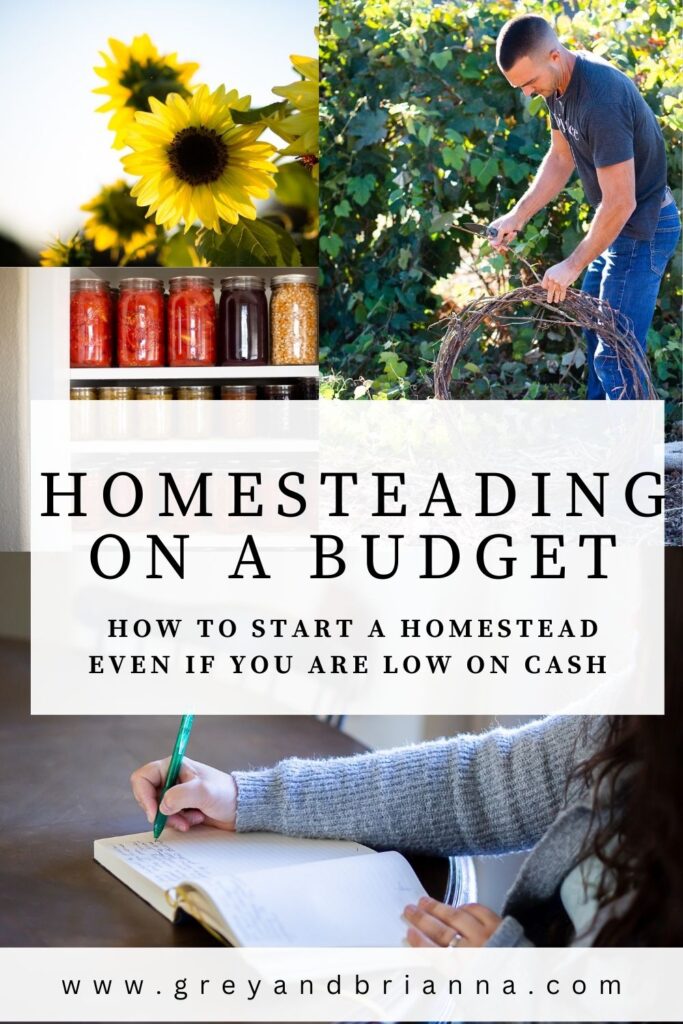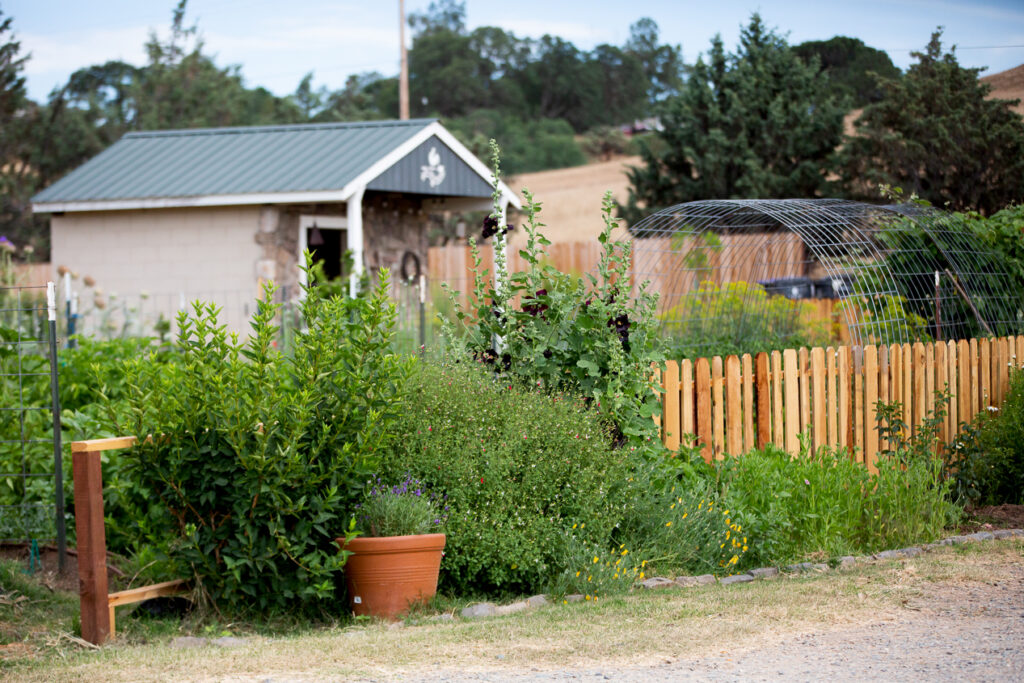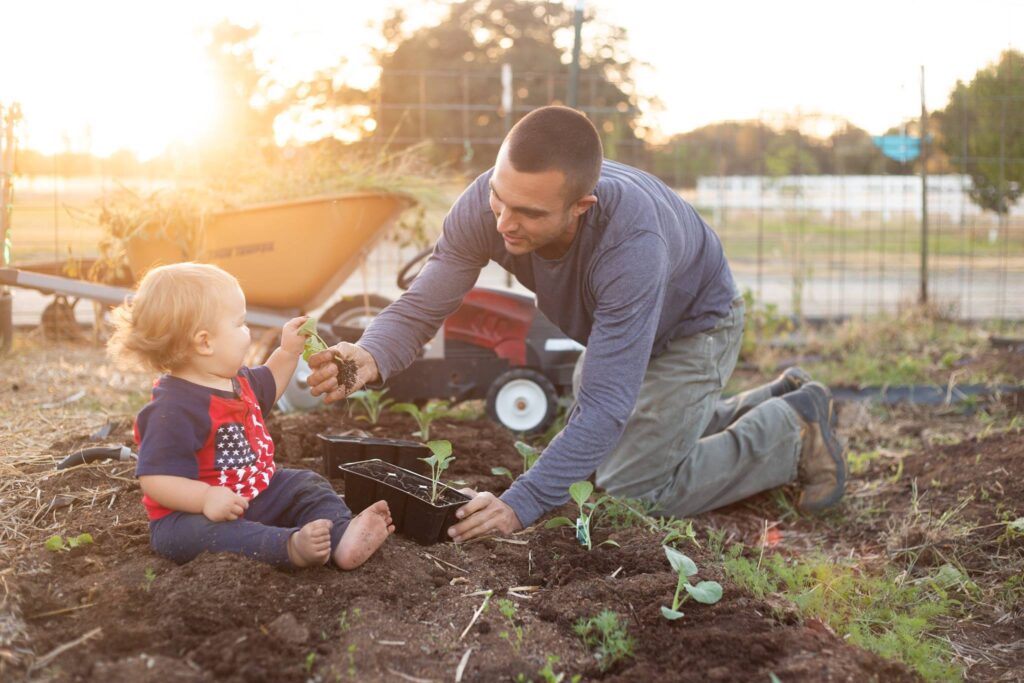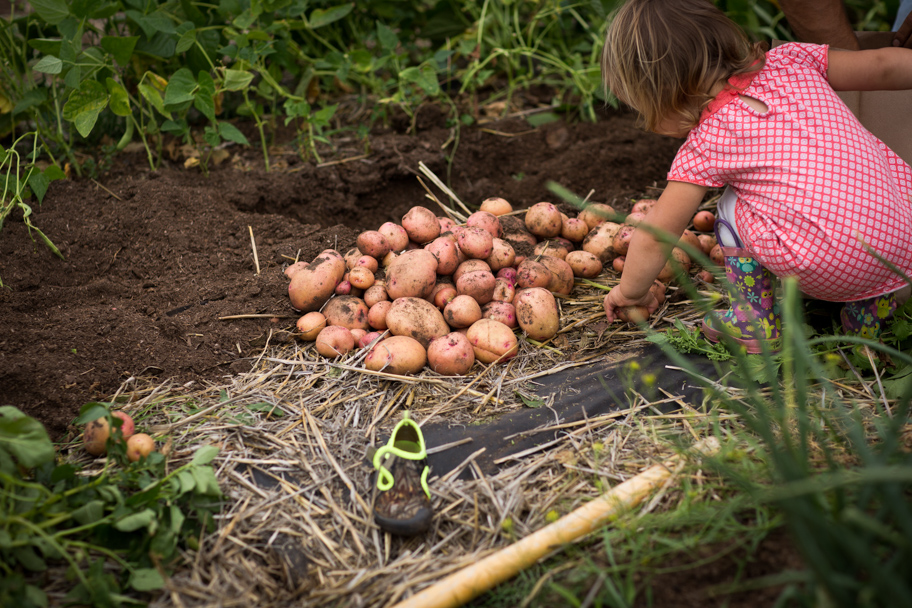If you are wanting to live a simpler life but are short on cash, these tips for homesteading on a budget will get you to going!

This post contains affiliate links which means I make a small commission at no extra cost to you. See my full disclosure here.
No matter how much income your household requires each month, a budget is something that is helpful to reach financial goals. Homesteading can be very costly these days with subsidized store-bought crops and goods. If you are wanting to live more sustainably and start your own homestead learning how to homestead on a budget will help you reach your homesteading and financial goals simultaneously.
We started small with one garden bed and a flock of a dozen chickens. Now we grow food on almost every square inch of our property and have learned how to do it all on the cheap. Making our own compost, getting creative on how we feed animals and manage the space without extra bells and whistles all can make homesteading on a budget easy.
1. Be intentional
This is an often overlooked step of super zealous new homesteaders. In the beginning it is exciting to to imagine the possibilities of ALL THE THINGS that can be raised. Being intentional about what you choose to invest time and money will you homestead on a budget. If you trying to save money be thoughtful about what you will actually eat. Start with only a few varieties of veggies and animal projects. Raising chickens for eggs and a small garden are a great place to start. Make sure to only grow vegetables you are currently using in your kitchen. If you don’t eat okra or eggplant…don’t grow them!

2. Simplify your life homesteading on a budget
Homesteading is adding to the to do list in a major way. Consider simplifying thing in your life that are not necessary because they no longer serve your family. Having a jam packed schedule is easy to have. It is much more difficult to protect your time and money by saying no to too many good things. Simplifying your life and schedule will have a ripple effect on your budget.
Every time you leave the house little purchases along with fuel to get your where are going are spent. These small purchases really add up to a lot of money and a lot of time. Homesteading on a budget starts by cutting unnecessary expenditures. Consider auditing your current lifestyle and see if you can simplify. This will leave more time, money, and peace of mind to spend at home on your homestead.
READ: 30 Ways to Lead a Slow Living Lifestyle
3. Plan your homestead budget
You know the saying: “if you fail to plan, you plan to fail.” This is true with almost anything especially homesteading! Set out reasonable actionable goals to set out a clear path for where you are going. Make sure you brainstorm ideas that will be attainable but also challenging. Consider of the cost of all the homestead projects you hope to take on. Write a detailed list on how you plan to get this done and put deadlines to motivate you to get it down within a time frame. Add your homesteading on a budget financial plans to this list as well!
READ: Ideas for What to Have on a Homestead | Homestead Planning

4. Make homesteading friends
Having a like-minded community is key when it comes to successful homesteading. Many people set off to be “self-sufficient” but community sufficiency is really a more realistic goal. Having homesteading friends not only can give you someone that can teach you new skills, but also help when times get tough.
If you’ve been homesteading for any length of time, you know that homesteading burnout is real. Friends can help you stay motivated to keep going. When it comes to saving money, many homesteaders love to trade. For example, if you have too many eggs, and your homesteading neighbor is swimming in tomatoes, you can consider trading. Having homesteading friends scan make homesteading on a budget MUCH easier!
READ: How to Be More Self-Sufficient
5. Avoid debt
This may be one of the more difficult tips to implement, simply because if you are wanting to homestead on a budget you may not have large cash reserves. Staying out of debt not only, is good for your peace of mind, but saves so much money long term, because you aren’t paying, interest or pesky late fees. A good rule of thumb is to not start a project without having cash on the barrel.

6. Start small to stay within your homestead budget
If you are trying to stay within your means and out of debt, starting small is key. Don’t fall for the trap of rushing into too many projects or a large homestead. Start where you are slowly developing skills needed to get you to your goal. Homesteading is a lifestyle that can take up a lot of time and money, so getting into it slowly can help you to not waste money!
READ: Homesteading Basics: 12 Skills You Need to Know
7. Start gardening
Gardening can save you lots of money or cost you lots of money. Gardening like most things, takes strategy to implement without breaking the bank. Start small when gardening and try to start your own starts. You will pay a pretty penny for store-bought starts, especially at big box store garden centers.
Think ahead and get your seeds early, and start them yourself. Again, homesteading on a budget comes all down to planning ahead! Consider swapping seeds with a neighbor. Once you get going you can save your own seeds and make your own compost which will only further your cost savings. Gardening is a wonderful and cost effective way to get organic produce to your family.

8. Preserve what you grow and what you gather–don’t waste!
Go back to point number one about being intentional. Do not grow anything that will just go to waste. Plan your homestead around your current lifestyle and not the other way around. There is nothing worse than, spending months growing food, only to have it all go to waste. Discipline yourself to get into the garden, even when you do not want to make sure nothing is going to waste. Develop your preserving skills, so you know how to save the food that you have worked so hard to grow.
9. Use what you have
Becoming a frugal homesteader and a DIY expert are almost synonymous. Start with what you have and get creative. See if you can make compost bins out of what you already have. Old pallets, buckets, etc.? It takes a little extra time, but put on a new set of lenses to look at what many might consider junk to make use of it in a new way. Always shop your property and home before going to the store to see if you’ve overlooked any materials that can be transformed into something that can be useful.
READ: How to Build a Chicken Hoop Coop

10. Learn to sew and mend
You don’t have to to start making all of your own clothes when you learn to sew, but having the skills can save you a lot of money. Mending clothes and pillows to make them last will contribute loads of money overtime. Sewing and mending is about making do with what you have and also developing a forgotten homesteading skill of the past.
11. Trade and barter to homestead on a budget
We are inundated with loads of things that we no longer have use for. Someone else might look at the same pile of stuff, and see it as gold for their current project! See if there is anyone that has anything you need that you can trade for. Modern day buy, sell, and give groups online make this extremely easy to find people in your area to trade and barter with. Learning to see the value of the things that you currently have can save you money the long term.

12. Get starts from other people
Why buy expensive starts from the box box store when with a little propagating knowledge you can get so many for free? Woody plants like raspberries, many trees, grapes, etc., are great for sticking into the dirt and watching grow with a little love and care. Any plant that re-roots itself like strawberries also make for great dig up and plant crops. Consider trading things like seed potatoes, garlic, and sunflower seed heads to get your garden going at low cost. Once you have an established space, you can re-plant volunteers where you want them in your own yard.
13. Borrow
Buying everything yourself isn’t necessary to start with. If you have any family, friends, or neighbors, consider borrowing items needed to get a project going. It is important to be careful and respectful with other people’s items, and reciprocate when you can. Many tools are only needed once for a project so borrowing is a great way to save you lots of money.

14. Raise chickens for eggs
Many people start by raising chickens for eggs, because they are a fairly cheap entry point into the homesteading world. It takes a little set up to get started, but once you have the supplies and an established flock, keeping chickens fed to supply you with eggs (an extremely cheap protein), is very cost effective. If they free ranch or have a place to forage, it will cost you even less. Make sure to collect all of the eggs to not waste and put them to use in your kitchen!
15. Save on seeds
Before you put in a seed order or buy them at the grocery store, see if a gardening buddy would like to swap seeds or you can save any seeds from last year. Seed saving is an incredibly powerful and useful skill to have to increase your homestead sustainability. Many serious gardeners have lot of seed storage that they would be happy to swap with you to increase their own seed variety collection.

16. Quit buying things you can’t afford
Staying out of debt is the number one way to save money on the homestead. If you start small, plan ahead, and save money for projects you can actually afford, you will surprised at how much money your homestead can save you. This takes budgeting and discipline, but it is so worth the piece of mind!
17. Build your own compost
Good quality compost can cost so. much. money. It is a simple way to started but it definitely will cost you. If you can develop the skill to make your own compost from organic materials around your homestead, you will be so ahead of the game! Composting is a learned skill if you want good quality. Take the time to learn how to compost well, so you’re not simply spreading weed seeds year after year.
READ: What is Compost Tea? Plus, How to Make it

18. Start a homestead in the right location
If you are totally starting from scratch and moving to a new property. Consider cost savings into your location plans. Many factors play into picking the perfect homestead property such as being close to family and friends, weather, landscape, etc. but if you are serious about saving some cash budgeting is one of them. The cost of living in a specific space, and how much work and infrastructure will you need to put in to get you started. Choosing a place that already has some outbuildings, barns, garden space, etc. could save you the cost of setting it all up yourself.
19. Grow your own feed
Growing fodder for livestock is a cost effective way to feed the animals on your farm. The cost of feed for poultry, sheep, goats, and cows is all going up. Growing your own is a great way to protect yourself from the rising prices. Buying an electric fence and grazing your animals in garden spaces that need to be cleared out, free ranging chickens, growing crops specifically for your animals, and making your own chicken feed are all great options for keeping costs low.

20. Make money from the homestead
More people now more than ever are desiring to have organic, local products. Growing extra food to sell to fund some of your homesteading costs is a great idea. With the rise in the internet you can even sell digital ebooks, courses, and instructional products to make a little money. Goods like: raw milk, eggs, animals, fresh produce, home baked bread, sourdough starter, herbs, or jams and jellies are all goods that are in high demand.
Homesteading on a Budget FAQ
How to start homesteading without money?
- Be intentional
- Simplify your life
- Plan your homestead budget
- Make homesteading friends
- Avoid debt
- Start Small
- Garden
- Preserve what you grow–don’t waste!
- Use what you have
- Learn to sew and mend
- Trade and barter
- Get starts from other people
- Borrow
- Raise chickens for eggs
- Save on seeds
- Quit buying things you can’t afford
- Build your own compost
- Start your homestead in the right location
- Grow your own feed
- Make money from the homestead
How do I start a mini homestead?
Starting a mini homestead or a micro farm is the most cost effective way to get started. Start developing skill that you can build on and re-think your space. Do you really need a lawn or can you put edibles in that space instead. The key to starting a mini homestead is to start right where you are.
Does homesteading really save money?
Homesteading can either cost you money or save you money, depending on how resourceful you are. With so many factors such as how big of a homestead and how efficient you it varies. Yes, homesteading can save you money, if it is done intentionally.
Related articles:
How to Beat Inflation at the Grocery Store
101 Homesteading Books You Need at Home
30 Ways to Lead a Slow Living Lifestyle
Ideas for What to Have on a Homestead | Homestead Planning
Pin it for later!


Leave a Reply